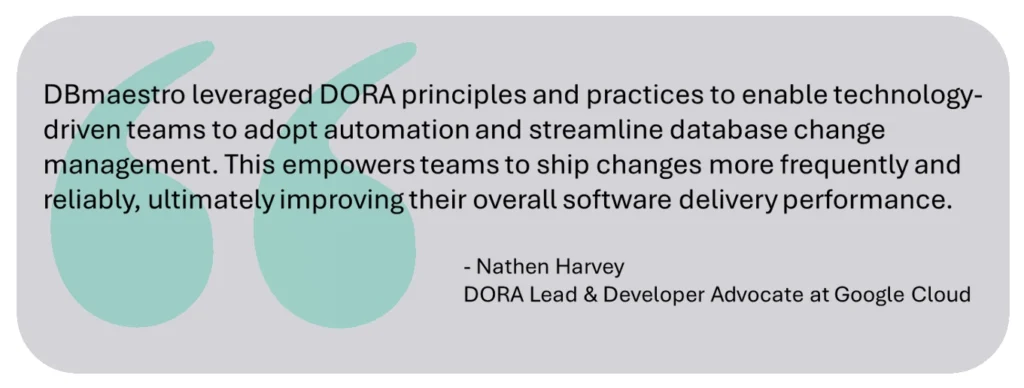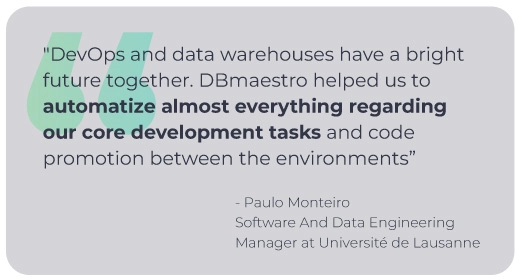At the heart of this transformation is the need for greater collaboration, speed, and efficiency in database development and release management. Organizations are no longer operating in an environment where databases are managed in isolation; they are part of a broader DevOps strategy where multiple personas, including DBAs, data architects, developers, project managers, data scientists, and security teams, contribute to database evolution.
The “Romantic Era” of Databases
In the early days of database management, DBAs reigned supreme. Database changes were carefully planned, executed manually using SQL commands, and rigorously controlled to prevent errors. This centralized approach provided significant advantages:
- Strict Change Control: Only authorized DBAs could implement modifications, ensuring a high level of oversight.
- Minimal Stakeholders: Fewer people had access, reducing the risk of conflicting changes or errors.
- Predictability and Stability: Database updates followed a slow, methodical process, ensuring reliability.
However, as businesses demanded faster time-to-market, real-time insights, and increased agility, this traditional model began to show cracks. The rigidity of the “Romantic Era” led to significant bottlenecks, slowing down innovation and making it difficult for organizations to keep pace with modern development cycles.
Additionally, organizations faced long queues for database changes, as DBAs struggled to keep up with the demand. Changes could take weeks—or even longer—to implement, making it impossible for businesses to respond quickly to market shifts. Attempts to speed up the DBA-driven change process often resulted in errors, security vulnerabilities, and even costly downtime. This inability to adapt swiftly hindered true agility, placing companies at a disadvantage in today’s competitive landscape.

The Modern Agile Era: A Multi-Stakeholder Landscape
Today, databases are no longer the sole domain of DBAs. Instead, they have become an integral part of a broader data ecosystem involving:
- Developers: Making frequent schema changes as part of CI/CD pipelines.
- QA Teams: Working with multiple database versions for testing.
- Data Scientists and AI Modelers: Accessing and modifying data for analytics and machine learning.
- Project Managers: Overseeing releases and ensuring business objectives align with technical changes.
- Security Teams: Ensuring compliance with regulatory requirements.
This shift has necessitated careful collaboration among these distributed stakeholders, many of whom operate across different time zones, teams, and business units. Without the right coordination and governance, multiple teams working on the same database risk introducing conflicts, inconsistencies, and security gaps.
This evolution has led to several critical challenges:
- Version Control Issues: With multiple teams accessing databases, keeping track of different versions for testing, reporting, and AI modeling has become complex.
- Increased Security Risks: More users with database credentials mean a higher risk of unauthorized changes and potential data breaches.
- Collaboration Bottlenecks: Without proper tools, multiple teams working on the same database can create conflicts and inefficiencies.
- Regulatory Compliance Challenges: Organizations must ensure that database changes align with industry standards like GDPR, HIPAA, and SOX.
DBmaestro: A Multi-Constituency Platform for Database DevOps
To address these challenges, organizations need a platform that enables seamless collaboration, automation, and governance. DBmaestro provides a multi-constituency platform, offering significant value across multiple personas by:
- Facilitating Collaboration Across Teams
- DBmaestro ensures that developers, DBAs, QA teams, and security professionals can work together without stepping on each other’s toes.
- It provides a structured workflow that allows changes to be reviewed, approved, and implemented efficiently.
- Role-based access controls ensure that only authorized stakeholders can make modifications, reducing risks associated with unauthorized access.
- Automating Database Release Management
- The platform streamlines database deployments by automating version control, change tracking, and release processes.
- This reduces human errors, eliminates bottlenecks, and accelerates development cycles.
- Continuous integration and delivery (CI/CD) principles are extended to database management, aligning it with modern DevOps best practices.
- Enhancing Security and Compliance
- DBmaestro enforces strict role-based access controls, ensuring that only authorized personnel can make changes.
- It provides an audit trail for all modifications, ensuring compliance with industry regulations.
- Organizations can easily track, review, and approve changes before they are deployed, reducing the risk of compliance violations.
- Reducing Risks and Conflicts
- By providing visibility into database changes, DBmaestro minimizes the risk of conflicting updates.
- The platform integrates with DevOps toolchains, ensuring that database changes align with application releases.
- Automated conflict resolution mechanisms help mitigate potential database schema drift.
The Future of Database Management
As organizations continue to modernize their database operations, the need for platforms like DBmaestro will only grow. The days of the isolated DBA controlling all database changes are long gone. Instead, we are in an era where databases must be agile, collaborative, and secure.
DBmaestro is at the forefront of this revolution, providing a comprehensive solution that empowers multiple stakeholders while maintaining control, security, and efficiency. The result is a faster, more reliable, and risk-free approach to database DevOps, ensuring that businesses can innovate without compromising their data integrity.
Conclusion
The evolution from the “Romantic Era” of database management to today’s Agile era marks a fundamental shift in how organizations handle data. With multiple stakeholders requiring access, the risks and complexities have increased exponentially. However, with the right tools and methodologies, businesses can navigate this new landscape successfully.
DBmaestro’s multi-constituency platform bridges the gap between database governance and agility, enabling teams to work together efficiently while maintaining security and compliance. As organizations continue to embrace digital transformation, ensuring that database management keeps pace with innovation will be critical for success.
In this fast-moving world, one thing is clear: the era of rigid, DBA-only database management is over. The future belongs to those who can embrace automation, collaboration, and security in their database operations.
]]>Database DevOps observability is a pivotal enabler of this understanding, providing deep visibility into database changes, deployments, and process performance. By capturing and contextualizing database activities, it ensures that organizations can proactively analyze, optimize, and secure their database environments with the same precision as application and infrastructure observability.
The Importance of Database DevOps Observability
While traditional observability focuses on applications and infrastructure, database observability is often overlooked, despite databases being a critical part of modern software systems. Database DevOps Observability extends this concept to database changes, deployments, and process performance, ensuring that database updates are as transparent and measurable as application code changes.
- Prevents Deployment Failures – Database schema drift, untested migrations, and conflicting changes can lead to system outages. Observability ensures early detection of risks.
- Accelerates Root Cause Analysis – By tracking schema changes, process performance, and DORA metrics, teams can quickly identify issues related to database deployments.
- Enables Compliance and Security Audits – Observability provides a clear audit trail of database changes, helping meet regulatory requirements and security policies.
- Aligns Database Changes with CI/CD Pipelines – Real-time insights into database deployments reduce the risk of bottlenecks, ensuring that databases evolve at the same pace as applications.
- Improves Performance Monitoring – Understanding delivery aspects behaviour, and schema modifications helps optimize database efficiency and reliability.
Without Database DevOps Observability, organizations risk flying blind when it comes to database changes, leading to process performance regressions, security vulnerabilities, and unpredictable release failures. Integrating observability into database DevOps practices ensures a more reliable, secure, and efficient software delivery process.
DBmaestro Introduces Database DevOps Observability: A DORA-Powered Solution
DBmaestro has recently launched a Database DevOps Observability module as part of its enterprise Database DevOps platform. This new capability is designed to provide organizations with deep visibility into database changes, deployments, and efficiency performance trends, ensuring that database releases align seamlessly with modern DevOps practices.
- Built on DORA (DevOps Research and Assessment) metrics, DBmaestro’s observability module quantifies database delivery performance, offering critical insights into: Deployment Frequency – How often database changes are successfully released.
- Lead Time for Changes – The time it takes for a database change to move from development to production.
- Change Failure Rate – The percentage of database deployments that require remediation.
- Time to Restore Service – The speed at which database-related failures are resolved.
By enabling Database DevOps observability, DBmaestro not only helps teams measure and improve database release efficiency, but also provides the key telemetry needed to understand and optimize the entire application development value stream. As applications become increasingly data-driven, database observability is essential for ensuring seamless, secure, and high-performing software delivery.

Why Organizations Must Adopt DBmaestro for Database DevOps Observability Now
As enterprises scale their digital transformation efforts, observability is no longer just a best practice—it is a business necessity. While application observability has gained widespread adoption, database DevOps observability remains the missing piece in achieving full-stack visibility and release stability. Without it, organizations face blind spots in database changes, untracked performance regressions, security risks, and unpredictable release failures.
With DBmaestro’s newly launched Database DevOps Observability module, organizations gain a DORA-driven, fully integrated approach to securing, streamlining, and optimizing database releases.

Key Drivers for Immediate DBmaestro Adoption
From Reactive Monitoring to Proactive Insights
Traditional database monitoring tools focus on detecting issues after they occur. DBmaestro shifts this paradigm by providing proactive insights, real-time visibility, and automated governance over database changes. This ensures teams can detect process efficiency degradation, security misconfigurations, and deployment failures before they impact production.
DORA-Based Metrics for Measurable Database Performance
DBmaestro’s observability module is built on DORA (DevOps Research and Assessment) metrics, providing organizations with quantifiable insights into:
- Deployment Frequency – Measuring how often database changes are successfully released.
- Lead Time for Changes – Tracking the efficiency of database development and deployment cycles.
- Change Failure Rate – Identifying risky deployments that require rework or remediation.
- Time to Restore Service – Accelerating the resolution of database-related incidents.
By embedding DORA-based observability, DBmaestro provides a data-driven approach to continuous improvement, aligning database deployments with enterprise DevOps goals.
Secure, Compliant, and Automated Governance
With security and compliance at its core, DBmaestro’s observability module ensures:
 Real-time enforcement of security policies to prevent unauthorized or risky changes.
Real-time enforcement of security policies to prevent unauthorized or risky changes.
 Audit trails and change tracking for compliance with GDPR, SOX, HIPAA, and other regulations.
Audit trails and change tracking for compliance with GDPR, SOX, HIPAA, and other regulations.
 Automated drift detection and remediation, eliminating manual errors and inconsistencies across environments.
Automated drift detection and remediation, eliminating manual errors and inconsistencies across environments.
Seamless Integration with DevOps Pipelines
Unlike traditional database tools, DBmaestro natively integrates with CI/CD pipelines, ensuring that database observability is embedded into the broader DevOps ecosystem. By aligning database deployments with application delivery cycles, organizations eliminate bottlenecks, reduce manual interventions, and accelerate time to market.
The Market is Moving—Fast. Don’t Get Left Behind.
Observability is no longer a luxury—it is a critical enabler of business resilience and agility. While application observability is widely adopted, database DevOps observability remains the missing link for many organizations. Companies that fail to implement database observability will struggle with unpredictable releases, compliance risks, and operational inefficiencies—while competitors gain full control over their software delivery pipelines with DBmaestro.
The DBmaestro Advantage: Observability for the Future of Database DevOps
With DBmaestro’s Database DevOps Observability module, organizations gain:
 Full visibility into database deployments with real-time monitoring and tracking.
Full visibility into database deployments with real-time monitoring and tracking.
 Automated security enforcement and compliance auditing to protect critical data assets.
Automated security enforcement and compliance auditing to protect critical data assets.
 DORA-based performance metrics to continuously optimize database DevOps efficiency.
DORA-based performance metrics to continuously optimize database DevOps efficiency.
 AI-driven anomaly detection and predictive analytics for proactive issue resolution.
AI-driven anomaly detection and predictive analytics for proactive issue resolution.
As businesses demand faster, more secure, and high-performing software, DBmaestro ensures that database DevOps observability becomes a key driver of enterprise success.
The time to act is now. 


